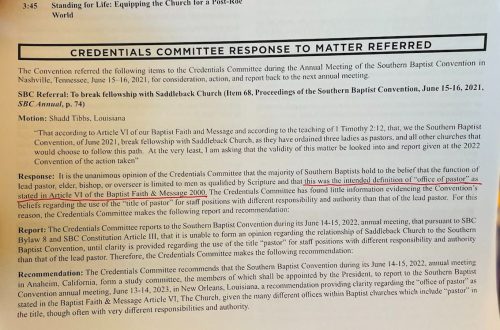The Baptist Press confirms that the Credentials Committee has yet to recommend removal of a church that employs women as pastors and that affirms women serving as senior pastors.
This is full-fledged egalitarianism, and now the Baptist Press is reporting that our own Credentials Committee received a referral two years ago and still has made no recommendation for their removal (see update below). The church is FBC Alexandria, VA, and according to Baptist Press the Credentials Committee sent an inquiry to the church in April in the form of a questionnaire. The questionnaire asked the church a variety of questions about their faith and practice concerning the office of pastor. The church answered the inquiry with a 12-page response.
Among other things, here is what FBC Alexandria told the Credentials Committee about their faith and practice. These are direct quotations from the church’s answers to the questionnaire (emphasis mine):
While we would concur… that there is indeed an office clearly identified by scripture entitled pastor/elder/overseer, we do not believe that the Bible limits the fulfillment of this office exclusively to men (p. 1).
Both men and women can satisfy the requirements of the pastor/elder/overseer office as outlined in the New Testament. For these key reasons, we believe there is nothing in scripture that could prevent a woman, simply by being female, from being considered for the Senior Pastor position within our staff. Other qualifying factors, however—even cultural—may make a consideration like this unhelpful or imprudent.
The church says that even though their female Pastor for Children and Women is an associate role, all of their pastors (senior or associate) have pastoral authority over the entire church:
While each pastor has direct responsibility over certain ministry areas, as a collective, they hold special authority within the congregation at large (p. 2).
This is not soft-complementarianism or a nomenclature problem. The church’s letter is a straightforward argument in favor of egalitarianism. You have to read the entire document to understand the scope of this. This is not a close call. FBC Alexandria interprets all the relevant Bible passages from an egalitarian standpoint, and they openly reject what the BF&M says about pastors being men as qualified by scripture. In one stunning sentence, they say that Paul’s restrictions don’t apply to their church:
While it is clear that Paul would not permit women to speak within the worship services of the churches in first century Corinth—due to its cultural and perhaps even legal impropriety—it would be incongruous for churches like ours to understand this same judgment as pertaining to our church in the same manner (p. 3).
The church’s statement also reveals a timeline that is relevant. The church was referred to the Credentials Committee in 2022, but the Credentials committee did not initiate this inquiry of the church for nearly two years. The Credentials Committee finally sent this inquiry on April 8, 2024, and the church responded with the answers above on May 6, 2024.
The church says that they intend to send their full slate of messengers to the convention in Indianapolis and to have previously attended the SBC annual meeting in order to oppose any measure that would exclude them from friendly cooperation.
Here’s the bottom line. This is an openly egalitarian church who laid all their cards on the table for the Credentials Committee. Because of the two-year delay, there is now no opportunity for the Credentials Committee to pursue their removal in time for the meeting in Indianapolis. This will be the third straight convention that has come and gone since the original referral.
This is why we need the Law Amendment. As I have said previously, we already have the processes that are needed to handle membership challenges. That’s not why we need the amendment. We need the Law Amendment to give clarity to those who preside over that process, like the Credentials Committee. When Saddleback was first referred to the Credentials Committee, the committee decline to take action in Anaheim and said that it wasn’t clear what a pastor is. The convention balked, and the committee finally took action the following year in New Orleans.
Now we have another church that is unambiguously egalitarian, and the Credentials Committee still hasn’t taken action. How do you think the Credentials Committee will respond to egalitarian churches like the one above if we don’t pass the Law Amendment? Do you think that they will act on such churches if the messengers reject the amendment? Wouldn’t the committee likely interpret the failure of the Law Amendment as an indication that they were right not to take any action?
Friends, we need the clarity that the Law Amendment provides. The Credentials Committee especially needs that clarity, and they need it quickly.
Postscript: After writing this post, I saw that SBC President Bart Barber posted a helpful explainer about what the passing/failing of the Law Amendment would mean (see video below). He is basically making the same point that I was trying to make in my Baptist Press article from last February.
The Law Amendment is not self-enforcing, as if a bunch of churches with female pastors will be automatically excluded if we pass the amendment. No, we have a process for challenging friendly cooperation that involves the Credentials Committee, the Executive Committee, and potentially the messengers. That process doesn’t change just because the Law Amendment is passed.
If that is the case, then what is the point of the Law Amendment? As I said in February, “We need it for the Credentials Committee to have clarity in their important work.” Although he opposes the Law Amendment, that is the same point that President Barber makes at the end of his video. He says, “It’s all about trying to give the Credentials Committee clear guidance about how to answer this question, ‘Is your church a cooperating church?'”
Not why to vote for the Law/Sanchez Amendment. Not why to vote against. Just an explainer of the moving parts and an argument as to why your church should not make stay/go decisions based upon whether it passes or fails. pic.twitter.com/10cYvZ6YvP
— Bart Barber (@bartbarber) June 4, 2024
Update: President Barber has posted a thread with the following clarification:
You may be hearing about a Credentials Committee decision in the FBC Arlington referral. There is no Credentials Committee decision. Some are taking the absence of a decision as a decision. Not true.
The Credentials Committee CANNOT make decisions about referring churches any later than the February EC meeting. Why? Because of Bylaw 8.
So, when you don’t refer a church to the committee until April 2024, you cannot possibly get a Committee decision for that year’s annual meeting.
They can’t do it because the Bylaw requires time for a church to give notice of appeal. The latest opportunity is therefore the February EC meeting.
Challenges raised at the Annual Meeting itself follow a different pathway in Bylaw 8. Those can be considered in the same annual meeting. But intra-meeting referrals must be submitted early enough for the Committee to be finished by the February EC meeting.
I believe that Dr. Barber’s thread has one important mistake in it. According to the BP report, FBC Arlington was not referred in April of 2024 but in 2022. I have seen documentation showing that the Credentials Committee confirmed receipt of the referral on June 3, 2022. That means that two annual meetings and six regular EC meetings have come and gone since the original referral. Why is this referral taking so long?
Although the committee received the referral two years ago, for whatever reason they did not initiate this questionnaire until April of 2024. This is where Dr. Barber has a helpful clarification concerning the process. Because the committee delayed this questionaire for nearly two years, they were unable to make any recommendations to the Executive Committee in time for three consecutive conventions, including the one coming up next week in Indianapolis. Although this clarifies why it is now impossible for the committee to recommend removal in time for the annual meeting, it does not explain why the two-year delay on the inquiry.
The Baptist Press story reports that the Credentials Committee did not close off the possibility of a future referral, so anyone who read the BP report should already be aware of this possibility. I read the BP report, and I did not mean to suggest in my post above that the Credentials Committee had disposed of this issue. I only meant to say that they have not made a referral yet and don’t plan to make one at the annual meeting next week in Indy. I have edited the language above to make clear that the Credentials Committee has not disposed of this referral yet and will not be able to do so in time for Indianapolis.
Nevertheless, after two years, the Credentials Committee still has not come to a decision, and that is the basis of the concern I’m registering above.
FBC Alexandria was referred to the Credentials Committee in 2022. Why was the Credentials Committee unable to conduct an inquiry before the February 2024 Executive Committee meeting? Why another year of delay even after last year’s annual meeting in which the messengers spoke so clearly on this issue?
Perhaps there is a reasonable explanation for all this. I assume good faith on the part of the committee members. We owe the committee the benefit of the doubt as to the faithfulness of their intentions, even if there remains some honest confusion about what a pastor is (in Anaheim the committee expressed confusion on this point).
In any case, even if the committee planned to make a recommendation next year, the delay alone seems more than enough warrant for the clarity that the Law Amendment provides.
[N.B. The pastor of FBC Alexandria informed his church last year that the Credentials Committee had reviewed their case and had deemed the church to be in friendly cooperation. Since the Credentials Committee has not disposed of this referral yet, the pastor must have been mistaken on this point.]






